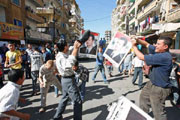VOA标准英语2011--Gadhafi's Killing in Libya Has Repercussions for Syria(在线收听)
Gadhafi's Killing in Libya Has Repercussions for Syria
The killing of Libya's ex-leader Moammar Gadhafi may prove a cautionary tale to autocrats in the region who face uprisings of their own. Those upheavals are keenly watched by Arab Spring protesters - especially in Syria.
Libyan expatriates partied well into the night outside the White House, celebrating the end to the 42-year reign of Moammar Gadhafi.
“I’m on cloud 9 right now," said one man participating in the celebration. "I’m on Cloud 9 of Cloud 9.”
"Oh my gosh, we are so happy, everyone wants to rent a plane and we all want to go back to Libya,” said a woman who was swept up in the moment.
But on the streets of Syria, there is violence at such celebrations. Activists say security forces killed at least 13 demonstrators as they cheered Libya's victory. Syrians are afraid to speak openly, but we contacted this Syrian who was there. VOA disguised the person's identity for protection and spoke via Skype.
"We feel so great - we feel like our brothers in Libya. We get more energy from his [Gadhafi's] death. We are calling for international protection and no-fly zone," said this person in Syria.
 |
| A protester uses a shoe to beat a picture of Syria's President Bashar al-Assad during a protest organized by Lebanese and Syrians living in Lebanon, in solidarity with Syria's anti-government protesters, in the port-city of Tripoli, northern Lebanon, October 21, 2011. |
It took seven months from the first uprising to officially end autocratic rule in Libya. NATO provided air support with the United States playing only a part. The U.S. suffered no casualties and spent far less than in other recent conflicts. U.S. officials consider their $1 billion to $2 billion share a bargain, and give Libyans the credit.
“You have won your revolution,” said President Barack Obama.
Now the Obama administration is reviewing the formula, hoping to transfer it to other countries.
“This is more the prescription for how to deal with the world as we go forward than it has been in the past," said Vice President Joe Biden. "So, that’s an example of how the world’s beginning to work together a little better.”
The Arab Spring began in Tunisia and moved to Egypt. Now there's success in Libya.
Former White House adviser Marc Ginsberg said, “Syrians are going to say, 'Why not us? Why, are we not as deserving as the Libyan people?' And it may in the end put more pressure on the administration to determine how and what to do about Syria."
The Syrian opposition has followed the lead of Libyans and formed the Syrian National Council. So far, they have not fought back with weapons. For that, Syrians would need international help… which no country is yet offering.